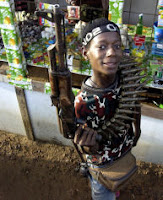 From Sierra Leone to Congo, from Afghanistan to Kosovo, child soldiers are the war weapon of choice, "easily manipulated, intensely loyal, fearless and, most important, in endless supply", the New York Times reports.
From Sierra Leone to Congo, from Afghanistan to Kosovo, child soldiers are the war weapon of choice, "easily manipulated, intensely loyal, fearless and, most important, in endless supply", the New York Times reports.Human rights groups say there are 300,000 child soldiers in the world, and no sign of the problem going away. The changing nature of conflict, in Africa in particular, is the reason why children are still recruited as "four-foot killing (machines)". Ideology was the main driver behind wars in Eritrea, Zimbabwe and most of the liberation struggles of the 1970s and 1980s. These days, the main goal of many conflicts, or at least many groups involved, is pillaging.
Emmanuel Jal, a hip-hop artist and a former child soldier, describes in Britain's Guardian the moment when he was enlisted at the age of seven to fight in south Sudan's 21-year war:
"When most kids where playing soccer, watching cartoons and learning how to read and write, I was learning how to fight. I left my home when I was seven after I saw a close relative raped and people's heads cut off by the government bombers... For years I was wielding an AK47, taller than myself."
The U.N. Convention on the Rights of the Child, which prohibits the recruitment and the use of children under 18 in any form of armed conflict, has been enforceable for the past five years. The United States and Britain, though, are among the countries which have refused to sign it.
The recent Hollywood blockbuster Blood Diamond examines the problem of child soldiers in Sierra Leone, where orphaned children or those kidnapped in the conflict end up accepting their new family of rebel soldiers and become "drug-addicted killers, without pity or fear." Then there's God Grew Tired of Us, a documentary produced by Brad Pitt, with Nicole Kidman as a narrator.
Events such as Live 8 and Make Poverty History certainly helped raising the profile of Africa, Cowley says. And the successes of Blood Diamond and The Last King of Scotland, a film about Idi Amin's rule of Uganda, showed Hollywood that "African stories, especially African war stories, sell."
[Reuters AlertNet]
No comments:
Post a Comment